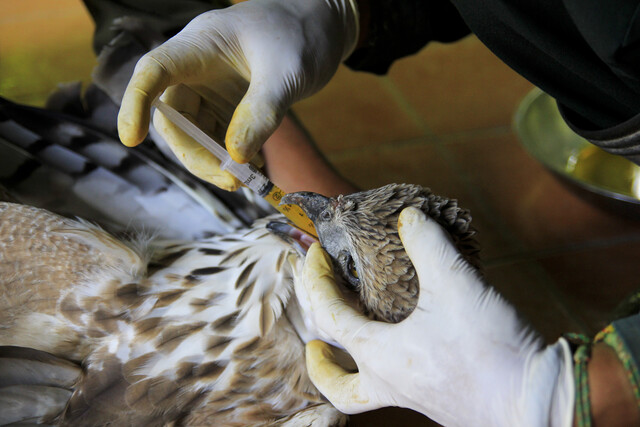Online Class: Lifelines of the Ocean — A Guide to Marine Wildlife Rescue

no certificate
with CEU Certificate*
-
12Lessons
-
25Exams &
Assignments -
392Students
have taken this course -
3Hours
average time -
0.3CEUs
Course Description
Picture this: a peaceful walk along the shore, waves lapping at your feet, when you notice a dolphin struggling in the shallows, a victim of an unseen battle for survival. It's a moment that stirs something deep within you-a desire to help, to make a difference. But how? Without the right knowledge, even the best intentions can fall short or do harm.
Marine life faces unprecedented challenges, from habitat destruction to the consequences of climate change. Encounters with stranded or distressed marine animals are becoming more common, and the need for informed, capable individuals has never been greater. This course offers you the tools to not only respond to these moments but to lead the charge in protecting and preserving marine life.
Imagine being the one who recognizes the subtle signs of a marine animal in distress, who knows exactly how to alert and assist professional rescue teams, ensuring every moment counts. With this course, you'll gain that insight and confidence. You'll learn the intricate dance between nature and humanity, understanding why strandings happen, how to respond safely, and what actions can make a lasting impact.
You'll explore the hidden stories of marine rescue operations-how dedicated professionals rehabilitate injured animals and prepare them for a second chance at life. You'll discover the critical role of laws and ethical guidelines that govern our interactions with these magnificent creatures. And most importantly, you'll be empowered to become an advocate for oceanic stewardship, learning how small changes in your daily life can ripple into meaningful environmental impact.
This is more than knowledge; it's transformation. You'll walk away not just with facts but with the conviction that you can make a difference. Whether you're a marine enthusiast, a conservationist at heart, or someone who simply feels the call of the ocean, this course will inspire and equip you to become a true guardian of the shore.
Are you ready to answer that call? The ocean needs its heroes. Let's make waves together.
- Completely Online
- Self-Paced
- Printable Lessons
- Full HD Video

- 6 Months to Complete
- 24/7 Availability
- Start Anytime
- PC & Mac Compatible
- Android & iOS Friendly
- Accredited CEUs

Course Lessons
Lesson 1. Stranding, Survival, and Stewardship: A Deep Dive into Marine Conservation
 Lesson 1 Video
Lesson 1 Video Review Practice Worksheet: Lesson-1-HomeWork-15634.pdf
Review Practice Worksheet: Lesson-1-HomeWork-15634.pdf Lesson discussions: Stranded Animals; Reasons for Taking this Course
Lesson discussions: Stranded Animals; Reasons for Taking this Course Complete Assignment: An Introduction
Complete Assignment: An Introduction Assessment: Lesson 1 Exam
Assessment: Lesson 1 Exam Assessment: Lesson 1 Review Exam
Assessment: Lesson 1 Review Exam
Lesson 2. Oceans Unveiled: A Dive into Marine Life
 Lesson 2 Video
Lesson 2 Video Review Practice Worksheet: Lesson-2-HomeWork-15638.pdf
Review Practice Worksheet: Lesson-2-HomeWork-15638.pdf Complete: Lesson 2 Activity
Complete: Lesson 2 Activity Assessment: Lesson 2 Exam
Assessment: Lesson 2 Exam Assessment: Lesson 2 Review Exam
Assessment: Lesson 2 Review Exam
Lesson 3. Seasonal Stranding Patterns and Conservation Strategies
 Lesson 3 Video
Lesson 3 Video Review Practice Worksheet: Lesson-3-Downloadable-15641.pdf
Review Practice Worksheet: Lesson-3-Downloadable-15641.pdf Complete: Lesson 3 Activity
Complete: Lesson 3 Activity Assessment: Lesson 3 Exam
Assessment: Lesson 3 Exam Assessment: Lesson 3 Review Exam
Assessment: Lesson 3 Review Exam
Lesson 4. Marine Mishaps: When Ocean Dwellers Meet Land
 Lesson 4 Video
Lesson 4 Video Review Practice Worksheet: Lesson-4-HomeWork-15644.pdf
Review Practice Worksheet: Lesson-4-HomeWork-15644.pdf Assessment: Lesson 4 Exam
Assessment: Lesson 4 Exam Assessment: Lesson 4 Review Exam
Assessment: Lesson 4 Review Exam
Lesson 5. An Unexpected Beach Encounter: How to Respond
 Lesson 5 Video
Lesson 5 Video Review Practice Worksheet: Lesson-5-Activity-15647.pdf
Review Practice Worksheet: Lesson-5-Activity-15647.pdf Assessment: Lesson 5 Exam
Assessment: Lesson 5 Exam
Lesson 6. Rescuing Marine Life: The Role of Stranding Networks
 Lesson 6 Video
Lesson 6 Video Review Practice Worksheet: Lesson-6-Activity-15651.pdf
Review Practice Worksheet: Lesson-6-Activity-15651.pdf Lesson discussions: Stranding Networks
Lesson discussions: Stranding Networks Assessment: Lesson 6 Exam
Assessment: Lesson 6 Exam Assessment: Lesson 6 Review Exam
Assessment: Lesson 6 Review Exam
Lesson 7. Essential Techniques for Marine Bird Rescue
 Lesson 7 Video
Lesson 7 Video Review Practice Worksheet: Lesson-7-WordSearch-15654.pdf
Review Practice Worksheet: Lesson-7-WordSearch-15654.pdf Complete: Lesson 7 Activity
Complete: Lesson 7 Activity Assessment: Lesson 7 Exam
Assessment: Lesson 7 Exam Assessment: Lesson 7 Review Exam
Assessment: Lesson 7 Review Exam
Lesson 8. When Sea Giants Need a Helping Hand
 Lesson 8 Video
Lesson 8 Video Review Practice Worksheet: Lesson-8-Activity-15658.pdf
Review Practice Worksheet: Lesson-8-Activity-15658.pdf Assessment: Lesson 8 Exam
Assessment: Lesson 8 Exam
Lesson 9. Unveiling the Ocean's Secrets: The Transformative Power of Necropsies
 Lesson 9 Video
Lesson 9 Video Review Practice Worksheet: Lesson-9-WordSearch-15661.pdf
Review Practice Worksheet: Lesson-9-WordSearch-15661.pdf Complete: Lesson 9 Activity
Complete: Lesson 9 Activity Assessment: Lesson 9 Exam
Assessment: Lesson 9 Exam
Lesson 10. Marine Animal Rehab: Compassion in Action
 Lesson 10 Video
Lesson 10 Video Review Practice Worksheet: Lesson-10-Activity-15665.pdf
Review Practice Worksheet: Lesson-10-Activity-15665.pdf Lesson discussions: Rehabilitation
Lesson discussions: Rehabilitation Assessment: Lesson 10 Exam
Assessment: Lesson 10 Exam
Lesson 11. Restoring Ocean Life: The Journey of Marine Animal Care
 Lesson 11 Video
Lesson 11 Video Review Practice Worksheet: Lesson-11-Downloadable-15669.pdf
Review Practice Worksheet: Lesson-11-Downloadable-15669.pdf Complete: Lesson 11 Activity
Complete: Lesson 11 Activity Assessment: Lesson 11 Exam
Assessment: Lesson 11 Exam
Lesson 12. Ocean Conservation: Preventing Wildlife Stranding
 Lesson 12 Video
Lesson 12 Video Review Practice Worksheet: Lesson-12-WordSearch-15672.pdf
Review Practice Worksheet: Lesson-12-WordSearch-15672.pdf Lesson discussions: What is your opinion of this course?; Program Evaluation Follow-up Survey (End of Course); Course Comments
Lesson discussions: What is your opinion of this course?; Program Evaluation Follow-up Survey (End of Course); Course Comments Assessment: Lesson 12 Exam
Assessment: Lesson 12 Exam Assessment: The Final Exam
Assessment: The Final Exam
Learning Outcomes
- Demonstrate understanding of the environmental and health-related causes of marine animal stranding by identifying at least three factors that contribute to these events.
- Describe the role of community involvement and education in marine conservation efforts by outlining at least two ways individuals can participate in conservation activities.
- Analyze the impact of overfishing on marine fish populations and outline conservation strategies to promote sustainable fishing practices.
- Identify and describe key adaptations of marine mammals, such as otters and polar bears, that enable them to thrive in saltwater environments.
- Analyze the impact of human interactions and environmental factors on the frequency and severity of marine animal strandings and propose strategies to mitigate these effects.
- Describe the seasonal patterns of marine animal strandings and explain their implications for stranding networks and conservation efforts.
- Describe the physiological adaptations marine animals use to survive in aquatic environments and the challenges they face when stranded on land.
- Identify human interventions that can either assist or further endanger stranded marine animals, and evaluate their effectiveness.
- Define and demonstrate the 'Check, Call, Care' protocol adapted for stranded marine animals to ensure effective and safe intervention.
- Identify and describe at least three common causes of marine animal stranding to promote awareness and prevention strategies.
- Describe the role of stranding networks in the rescue and rehabilitation of marine animals, emphasizing the contribution to scientific research on marine ecosystems.
- Identify the legal frameworks supporting stranding networks, specifically the Marine Mammal Protection Act and the Endangered Species Act, and analyze their impact on marine conservation efforts.
- Define the circumstances under which human intervention is essential in bird rescue by observing and assessing the bird's condition for potential threats or injuries.
- Demonstrate mastery of lesson content at levels of 70% or higher.
Additional Course Information

- Document Your Lifelong Learning Achievements
- Earn an Official Certificate Documenting Course Hours and CEUs
- Verify Your Certificate with a Unique Serial Number Online
- View and Share Your Certificate Online or Download/Print as PDF
- Display Your Certificate on Your Resume and Promote Your Achievements Using Social Media

Choose Your Subscription Plan
No Certificate / No CEUs
This course only
| Includes certificate | X |
| Includes CEUs | X |
| Self-paced |

|
| Instructor support |

|
| Time to complete | 6 months |
| No. of courses | 1 course |
Certificate & CEUs
This course only
| Includes certificate |

|
| Includes CEUs |

|
| Self-paced |

|
| Instructor support |

|
| Time to complete | 6 months |
| No. of courses | 1 course |
Certificates & CEUs
Includes all 600+ courses
| Includes certificate |

|
| Includes CEUs |

|
| Self-paced |

|
| Instructor support |

|
| Time to complete | 12 Months |
| No. of courses | 600+ |
Certificates & CEUs
Includes all 600+ courses
| Includes certificate |

|
| Includes CEUs |

|
| Self-paced |

|
| Instructor support |

|
| Time to complete | 24 Months |
| No. of courses | 600+ |
Student Testimonials
- "It was a fun course to take!" -- Abby H.








